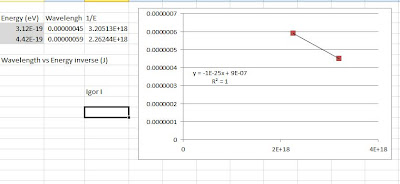Planck's Constant from LED
Purpose: to estimate and calculate the value of Planck's constant using everyday light source.
Procedure:
This lab explored one of the nature of light's energy: E = h f = hc/λ
By knowing (or estimating) λ, and since c is a constant, Planck'cs constant can be calculated since it is proportional to Energy. Two different diodes: blue and yellow were used. Each wavelength λ was estimated roughly to be 450 nm for blue and 590 nm for yellow.
When one looked through diffraction grating, one see a blue line on the blue diode and yellow for yellow, as expected. This confirms that the diodes were mostly monotone/ coherent (only reflects a narrow range of color; instead of seeing many lines, only blue line is observed).
Calculation and data:
Since E = hc/λ and c is constant; E = 1/λ or 1/E = λ.
The graph of 1/E vs λ
The slope is the planck's constant.
Slope, m is roughly 1.50e-25 and is equal to hc. Dividing with c, the value of 5.00e-34. (actual h = 6.62e-34; % difference = 24.5%)
Error:
The large percent error (24.5%) is due to the approximation of the wavelength of the diodes (estimated to be 450 nm and 590 nm from online source).
Another room for error is due to the electric potential. Although potential was more accurate than wavelength, the potential was not truly exact due to many other uncounted external resistors.





No comments:
Post a Comment